Exploring Yellowstone by RV
Navigating Your RV Safely Inside America's Oldest National Park
Article Date: May, 2011
Article and Photography by Mark Quasius
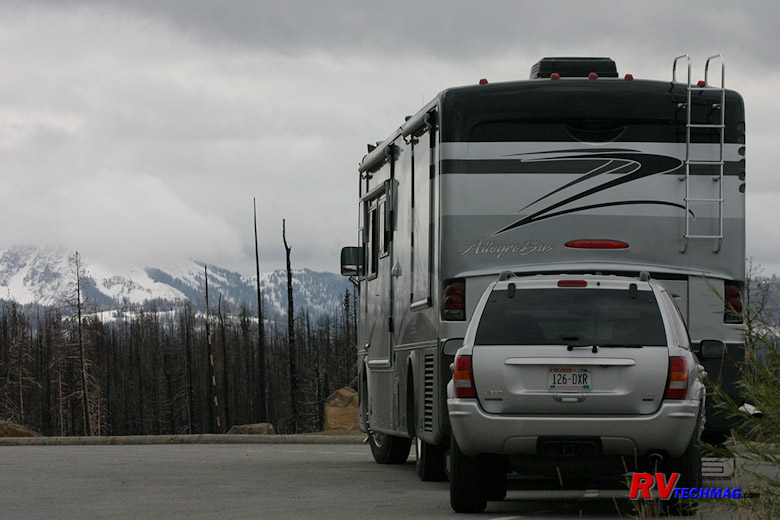
My Personal Recommendations
Okay, now that you've been given the overlay and descriptions you might ask which way I would go. The truth is, we've taken
many different routes because we've had different scenic goals throughout the many trips we've taken. Each version depends on what your goals will
be and how much time you have to manage them.
If you only have 4-6 days in Yellowstone and are coming from the east, and want the most scenic bang for the buck I'd do my
favorite route - Plan A. If you have 6-8 days and want to include the Tetons I'd go with Plan B. My personal opinion is that the Tetons are "okay"
in summer but with 5 days or less I'd skip them and concentrate on Yellowstone. However, in fall things really change in the Tetons and if you have
the time I'd definitely go see them. If your fall trip is only 6 days I'd recommend going with Plan A and making the Tetons a day trip with the
toad, leaving from and returning to West Yellowstone. If you have more days you can go with Plan B and stay in Jackson for a few days. In fall the
Tetons come alive with moose and elk and the Aspens change to bright golden hues the end of September. Grand Teton park is vibrant in the fall but
somewhat bland and dead in the summer.
|
If you only have 4-6 days in Yellowstone and are coming from the east, and want the most scenic bang for the buck I'd
do my favorite route - Plan A. If you have 6-8 days and want to include the Tetons I'd go with Plan B. My personal opinion is that the Tetons
are "okay" in summer but with 5 days or less I'd skip them and concentrate on Yellowstone. However, in fall things really change in the Tetons
and if you have the time I'd definitely go see them. If your fall trip is only 6 days I'd recommend going with Plan A and making the Tetons a
day trip with the toad, leaving from and returning to West Yellowstone. If you have more days you can go with Plan B and stay in Jackson for
a few days. In fall the Tetons come alive with moose and elk and the Aspens change to bright golden hues the end of September. Grand Teton
park is vibrant in the fall but somewhat bland and dead in the summer.
|
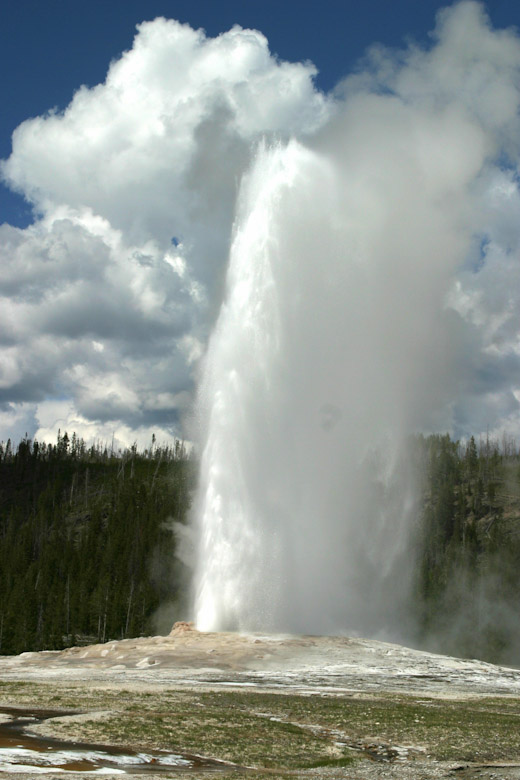
Old Faithful is the number one attraction in Yellowstone.
|
If you are not comfortable with mountain driving and would prefer to skip the Beartooths in favor of a more sedate drive,
I'd go with Plan C. It's an easy drive with decent scenery and you won't have any stress. Many RVers are comfortable with the Beartooths but there
are enough that just want "easy" so Plan C is a good choice. Plan D is if you want to visit the wild mustang herds in the Pryor Mountains. Then
you'll need access to Bighorn Canyon, just north of Lovell, WY which means you'll exit Yellowstone via the east entrance and take US-14A from Cody.
Plan A
Approaching from the east you'll be coming into Montana on I-90. (A quick note here - If you are planning on seeing the
Black Hills on this trip do it prior to seeing Yellowstone. The Black Hills are nice and
Custer State Park is an excellent state park, worthy of national
park caliber. However, after seeing the spectacle of Yellowstone it just won't measure up. Seeing the Black Hills after you've finished Yellowstone is
sort of like eating your potatoes after you've finished your dessert. Shortly after passing through Billings, MT you'll pick up US-212 at Laurel. Take
it south to Red Lodge, MT. Stay there at one of the RV parks in the area. You have a few options here but it's important to stay at Red Lodge so that
you are within striking range of the Beartooths and Yellowstone's northeast entrance. If you get here mid-day you won't have enough time. You'd be
driving like crazy just to cross the Beartooths and make it to your Yellowstone destination by supper or early evening, depending on where your
destination is. So, plan on base camping in Red Lodge.
|
The next day you can leave at 8 AM to make the trip over the Beartooths, this will get you to Top of the World Store
just before lunch. Then you can unhook the toad and do some exploration of the side roads. This also gives you adequate time to pull over and
admire the scenery on the way up the Beartooths. After lunch you can head down through Cooke city and into Yellowstone via the northeast entrance.
You'll pass through Lamar Valley and arrive at Tower Junction mid afternoon. You will then take road that crosses the northern end of the park
to get to Mammoth. Your only other choice is south to Canyon but that would take you up over Mount Washburn via Dunraven Pass and you don't want
to do that in a large RV. Save that for the toad later on.
|
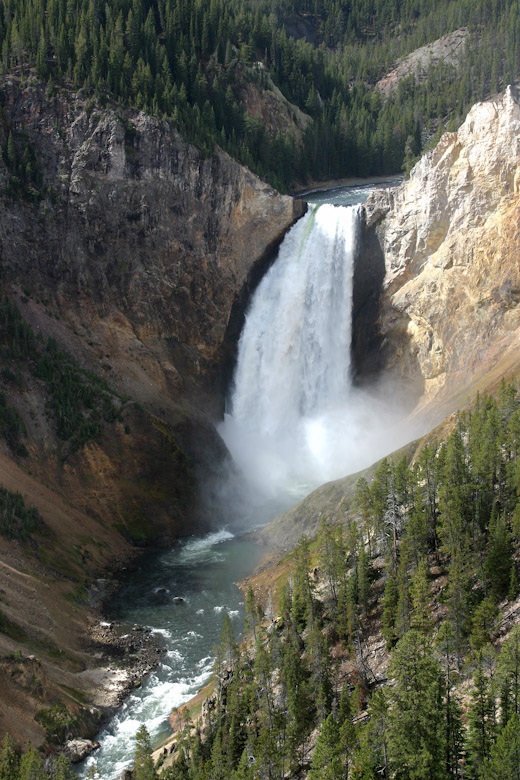
The Yellowstone River plunges 308' into the Grand Canyon of the Yellowstone at Lower Falls.
|
Once at Mammoth you have some more options. You can continue south through Norris and Madison to get to West Yellowstone where
you can stay at one of the full service RV parks, generally Grizzly RV Resort. You can do this
if your time is limited or you just don't want to split it up by staying at multiple locations. Otherwise, you can stay in Gardiner at one of the two
RV Parks there for a couple of days, then move south to West Yellowstone. We prefer to do this because it gives us the ability to explore Mammoth,
Norris, Tower Falls, and the Blacktail Plateau area with minimal driving time shuttling back and forth from West Yellowstone. Another option would be
to stay at the no services campground (but roomy) at Mammoth.
An alternative to the one night stay at Red Lodge would be to do 2-3 nights there. If you have the time, this is ideal. You can
take the toad up into the Beartooths and explore the area as well as get a greater feel for Red Lodge itself. It would also give you a great chance to
see the switchbacks that climb the Beartooths and once you've done that you can decide whether or not to climb them in the RV or take the Belfry bypass
and come in on the Chief Joseph Highway mentioned earlier, thereby bypassing the steep climb. The Belfry bypass is also a great backup route on a fall
trip should a sudden snowstorm blanket the north face. Another option is to leave Red Lodge to the north via Absarokee and head over to Bozeman and then
down to West Yellowstone. This is a bit more mileage but it's easy driving and the higher highway speeds will get you ther ein about the same time. You
can also do a similar route to get to Gardiner or Mammoth if that is your destination. Again, same travel time but more miles.
Once you are done with West Yellowstone and have seen the park, head east to Canyon, then south to Fishing Bridge, and then out
the east entrance. Leaving west Yellowstone at 8 AM, you'll pass through Pahaska, Shoshone Canyon, Wapiti Valley and arrive at Cody, WY late morning.
If you want to stay at Cody at one of the full service RV parks there you don't have to leave that early but if you want to continue on, you'll need to
leave at 8 AM so that you can reach Buffalo by 5 PM. From Cody I'd head east on US-14 to Greybull. If you are interested there is a large airport there
with fire fighting bombers that you can tour. After Greybull, head south to Worland where you can pick up US-16 and head east to Buffalo. US-16 is the
easiest drive across the Bighorns and goes through some spectacular scenery, including Ten Sleep Canyon. We stay at the Indian Campground in Buffalo
and try to east at the Occidental Hotel, which is an old restored hotel that Butch Cassidy
frequented and now serves excellent dining fare, including great western steaks and prime rib.
Note that you can choose to take US-14 or US-14A east over the Bighorns to get to Ranchester and eventually Sheridan but be sure
to read the section on the Bighorns before doing so.
|
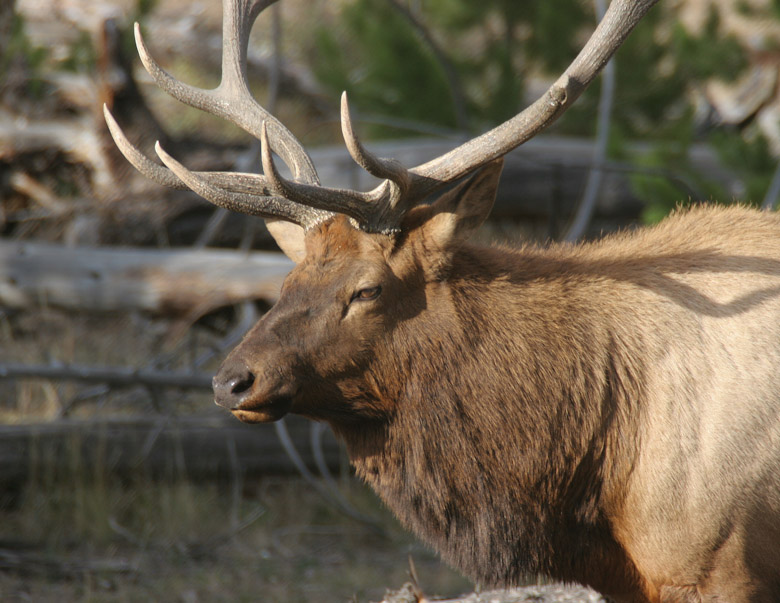
Bull elk are active during the fall rut.
|
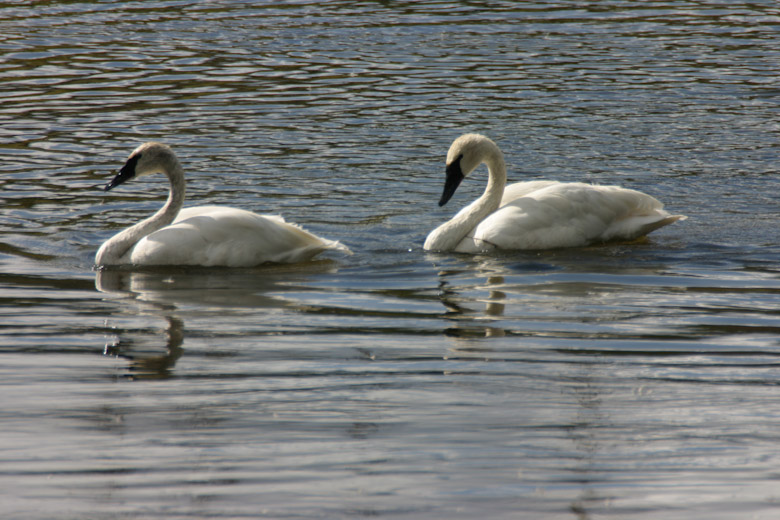
Trumpeter swans can be found in various places in the park.
|
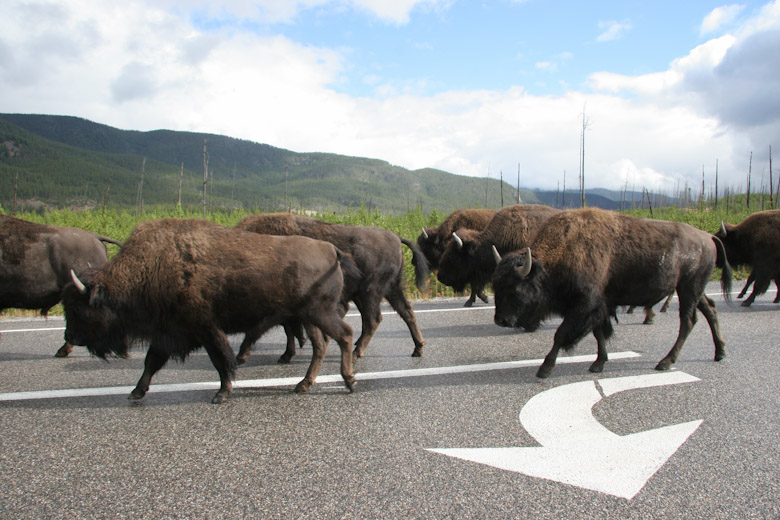
Bison use the roads whenever they want and you need to allow adequate time to allow for bison jams when driving in the park.
|
Plan B
This similar to Plan A in that the entrance to Yellowstone is identical. However, it includes staying at Grand Teton National Park
so the exit path is different.
Taking the above information into consideration, arrive at West Yellowstone and do your sightseeing accordingly. Once you are done
with Yellowstone, leave West Yellowstone and pass by Old Faithful and Lewis Lake on your way out of the park through the south entrance. You'll then drive
along the Nelson Rockefeller Parkway alongside Jackson Lake, arriving at Oxbow Bend just in time for lunch if you leave West Yellowstone around 8 AM.
There's a nice pulloff area there and you may see moose in this area as well as a nice backdrop of the Tetons reflecting in the Snake River. Continuing
on you can either stay at the nearby Grand Teton RV Resort, immediately outside the park at
Moran Junction or head south to Jackson, WY. We prefer to stay at
The Virginian Campground in Jackson due to its proximity of services in downtown Jackson as well as the southern regions of the park itself. Be sure
to eat at the Gun Barrel Restaurant for excellent steak and wild game. It's within walking distance
from The Virginian.
After we have finished with the Tetons we drive up to Moran Junction and head east. Crossing the scenic but easy Togwottee Pass you
are quite apt to see moose in the roadside habitat. This will also take you through Dubois, WY where you may want to stop and see the
Bighorn Sheep Center there. Dubois is home to the National Bighorn Sheep Preserve on Whiskey
Mountain so you might want to see that as well. The Dubois KOA is a great choice should you decide to do that. If you want to skip Dubois, just keep on
driving through. We follow the road to Riverton, then up to Thermopolis and generally park at a pulloff area overlooking
Thermopolis Hot Springs State Park and eat lunch there. After
Thermopolis we head to Worland and then through Ten Sleep Canyon to Buffalo.
A quick note on Buffalo - There is a lot to see and do here and it must be a well kept secret because no one seems to know that.
The Bighorns are spectacular and full of wildlife as well as wildflowers in late July. The area north of Buffalo is full of cavalry battles along the
Bozeman Trail and eventually leads to the Little Bighorn Battlefield, just 120 miles to the north. Butch Cassidy's Hole in the Wall is to the south near
Kaycee. You could spend plenty of time here as well.
|
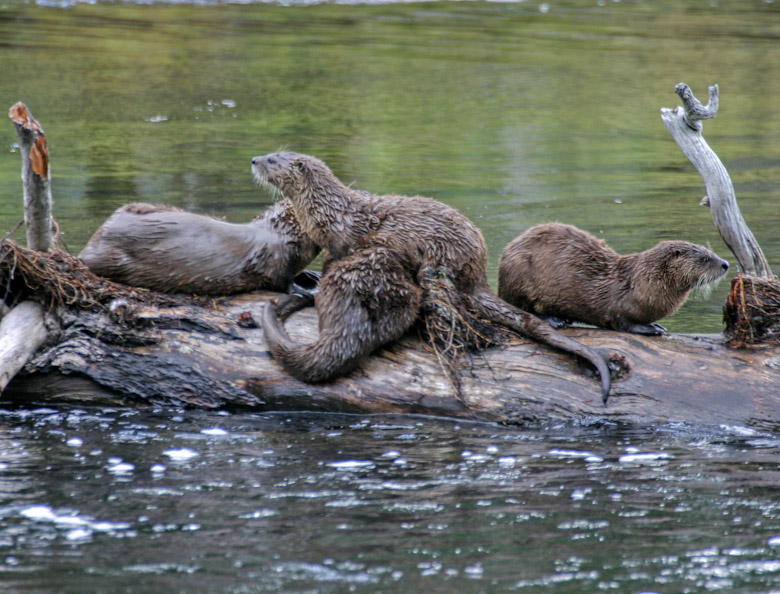
River Otters resting on a log in the Madison River.
|
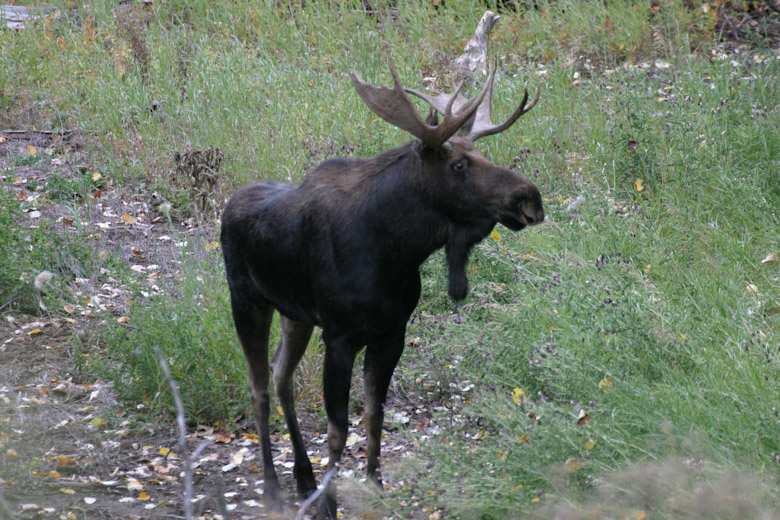
Mooase are generally found in wet habitat lush with sedges or willows.
|
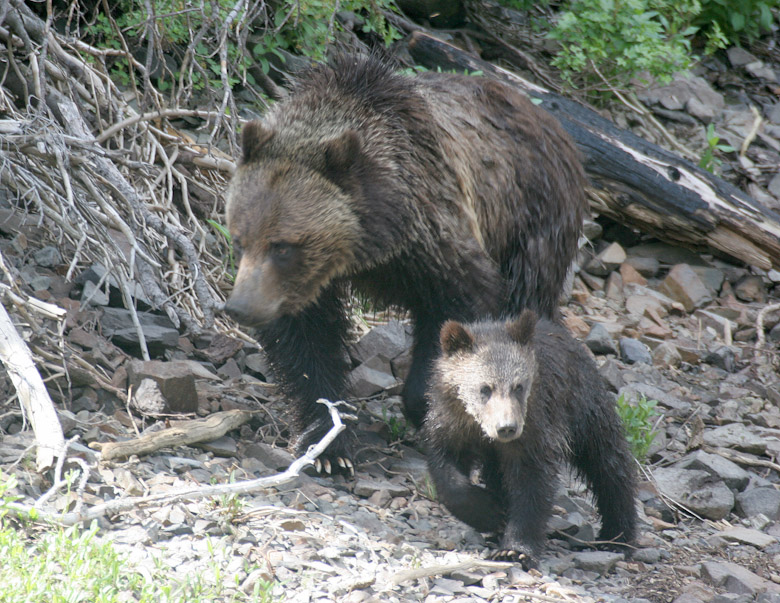
Grizzly bear are found throughout the park but not always seen by visitors. This sow and cub were seen near the east entrance.
|
Plan C
This is the one that skips the northeast entrance and the Beartooths in favor of a leisurely drive to West Yellowstone.
Take I-90 west to Bozeman, MT. From Bozeman take US-191 south through Big Sky and the scenic Gallatin Canyon. This will take you
into West Yellowstone via a fairly flat (for Montana anyway) and non twisty 3 hour drive. We stay at Sunrise Campground whenever there. Leaving
Yellowstone you can use either the tail end of Plan A or Plan B.
Plan D
This route can be used regardless of which entry route you choose to take into Yellowstone. The exit route takes you to Cody, WY
where you'll split off on US-14A to see the Pryor Mountain wild mustang herds in the Bighorn Canyon north of Lovell. Finally you'll cross the Bighorns
via the super steep US-14A climb on the west flank of the mountains.
You'll exit Yellowstone via US-14, which takes you to Cody, WY. It's best not to leave Yellowstone in the morning or else you'll
have to really rush to see the mustangs in the Bighorn Canyon. Then you'll wind up rolling into Sheridan, WY right at supper time and you'll be forced
to stay at the so-so Sheridan KOA rather than continue on to the much nicer campgrounds in Buffalo. I'd recommend staying at Cody if you want to see the
Mustangs. It's an easy half day drive to Cody from West Yellowstone so that'll give you the afternoon to see the sites of Cody and put you within
striking range of the mustangs for the next day's departure. Leaving Cody will get you to Lovell late in the morning. You can park the RV at the Bighorn
Canyon National Recreation Area visitor center and take the toad in to see the mustangs.
After a few hours of sightseeing plus some time for lunch you can then begin your ascent of the Bighorns via US-14A. You can leave
your toad unhooked when leaving Lovell if you want so that you don't have to stop and do it later. It'll make a big difference when you begin your climb.
When you finally get to the top you can pull over at a scenic turnout and let the RV rest a bit while you reconnect the toad to the RV and take some
scenic pictures. Then you cross over the top of the mountains, stopping at Burgess Junction if you like, and finally pick your way down the much easier
switchbacks on the east flank of the mountains. Then you'll head through ranch country until you reconnect with I-90 and head south to Buffalo.
Return to Home Page
If you enjoyed this article be sure to recommend RVtechMag.com to your friends, like us on Facebook or Twitter
or subscribe to our RSS feed.



|













